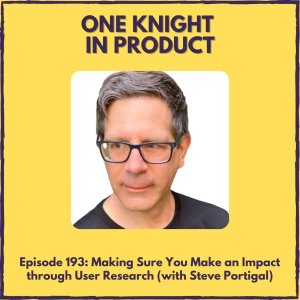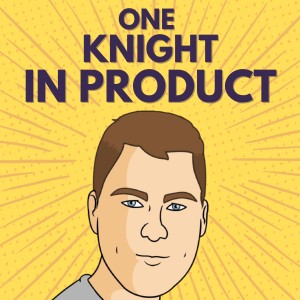
Making Sure You Make an Impact through User Research (with Steve Portigal, User Research Consultant & Author ”Interviewing Users”)
 2023-12-02
2023-12-02
Steve Portigal is an experienced user researcher and author of two books, "Interviewing Users" and "Doorbells Danger, and Dead Batteries". Steve is a passionate advocate for the value of user research, and ensuring that people can find out compelling insights from their users. He's recently re-released a 10th-anniversary edition of "Interviewing Users", and we spoke about some themes from the book and how to make an impact with user research.
Episode highlights:1. Some people are still wary of user research, or think they don't need it, but it remains as important as ever
It can be tempting for founders to think they know exactly what they need, rely on feedback from customer-facing teams, or not speak to anyone until they've already built the thing they want to build. Feedback from sales teams and founders is an incredibly important vector, but should only be the start of the discussion never the end.
2. Continuous discovery and point-in-time research both have a place in a researcher's armouryThere are methodological constraints to continuous research, alongside the difficulty of finding the time and buy-in to do it but, on the other hand, it can be incredibly impactful to have rapid research tightly coupled to the product team. On the other hand, well-planned up-front research can still help you to find truly disruptive insights for your company. Do both!
3. We all have cognitive biases - we should accept that and be honest with ourselves about their effectsPeople look at the word "bias" and worry about the negative connotations, but "bias" just represents how our brains are wired. Cognitive biases will affect how we interview people, and we should do our best to counteract their effect and improve on getting better (even if we're not perfect).
4. The best research has a tangible impact rather than being research for research's sakeIt can be a heavy burden to bear if all of your well-planned and well-executed research ends up having no effect on decision-making at all. It's important not to get downhearted, and work out ways to build actionable, accessible repositories to enable your stakeholders to make the best decisions possible.
5. There are a lot of similarities between good user research and improvWe don't need to be able to create 45-minute plays off the cuff, and knowing when to stick to our interview plans and when to deviate from the script, enables us to get to the real generative insights that we need from our users and find out what we don't know we don't know.
Buy "Interviewing Users (2nd edition)""Interviewing people is a skill that most professionals who do research assume they already possess. But not everyone knows how to ask questions well. Expert researcher Steve Portigal updates his classic Interviewing Users to provide fresh guidance on interviewing techniques, as well as new content. This edition includes a new foreword by Jamika D. Burge and features two new chapters: one about analysis and synthesis and sharing research results, and another about ensuring that your user research efforts will have an impact on your organization. There are seven new short essays (we call them sidebars) from guest contributors. Plus, you’ll find updated examples, stories, and tips for leading interviews, and new sections about bias, remote research, ResearchOps, planning research, and research logistics. You’ll move from simply gathering data to uncovering powerful insights about people."
My listeners can get 20% off with promo code KNIGHT on the Rosenfeld Media website. This code is valid until 21st December, 2023. Alternatively, check it out on Amazon.
Contact SteveYou can catch up with Steve on LinkedIn or visit Portigal.com.
More Episodes
Create your
podcast in
minutes
- Full-featured podcast site
- Unlimited storage and bandwidth
- Comprehensive podcast stats
- Distribute to Apple Podcasts, Spotify, and more
- Make money with your podcast
It is Free
- Privacy Policy
- Cookie Policy
- Terms of Use
- Consent Preferences
- Copyright © 2015-2024 Podbean.com






